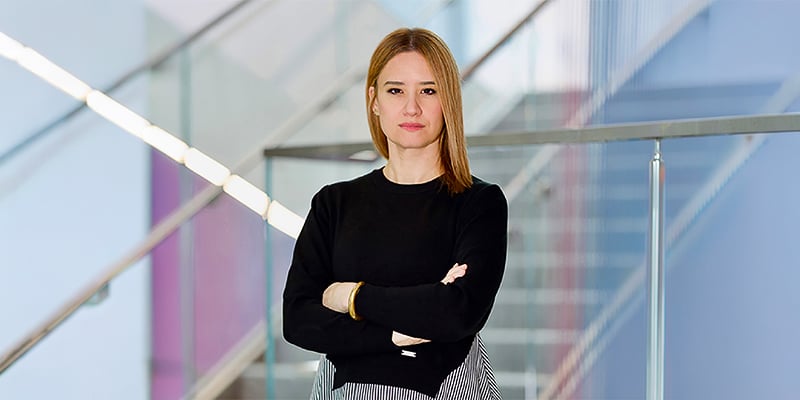Casey Greene, PhD, has a lot of tips for fellow scientists traveling with young children to conferences: invest in a good backpack over a diaper bag, always ask the hotel for a crib, and schedule the flight with a connection – it’ll give you time to change a diaper and feed.
Greene, founding chair of the University of Colorado Department of Biomedical Informatics (DBMI), quickly became an expert on the subject after his daughter was born in 2018. The two traveled more than 25,000 miles together in her first six months of life.
This year, with Greene at the helm, the department is sponsoring dependent care grants at the International Society for Computational Biology’s (ISCB) flagship conference, the Intelligent Systems for Molecular Biology (ISMB). It's an effort that extends opportunities to caregivers of all kinds and makes scientific conferences more inclusive.
“There’s a lot of value in attending scientific conferences,” Greene says. “It helps trainees when they’re starting out building their network, surveying the field, and understanding different career paths. For faculty, it helps maintain networks, learn about new technology, and stay current in the field.”
Creating opportunities for caregivers
The ISMB 2023 conference takes place in Lyon, France, and while neither Greene nor his daughter are joining DBMI colleagues there this year, he knows what it’ll take for most fellow caregivers to take part in the event.
“Having childcare options means that people who couldn’t otherwise attend because they are caregivers now have options to be there,” Greene says.
Candidates eligible for the grants must be ISCB members, have an accepted presentation submission at the conference, be a primary caregiver, and demonstrate financial need. If they receive the grant, they’ll get $600 to spend on childcare that works best for them.
“I hope there is a caregiver who uses this ISCB grant to attend the meeting, who makes the connection they otherwise wouldn't,” he says. “I hope that helps them find their next job, read a new paper, or meet a colleague who suggests a valuable experiment they wouldn't have otherwise done.”
Appealing to attendees
Lucia Peixoto, PhD, chair of ISCB’s equity, inclusion and diversity committee, says it was because of grants — similar to the ones the DMBI in the University of Colorado School of Medicine are sponsoring this year — that made it possible for her to attend conferences when she had young children and was working on growing her professional network.
“Traveling is hard and expensive when you have somebody who really depends on you,” says Peixoto, now an assistant professor of translational medicine and physiology at Washington State University. “I could do it because my partner could stay with the kids, or we’d bring grandma, but that isn’t cheap to do.”
Peixoto helped lead the development of the grant process. She says the decision to offer grants rather than another option, such as a childcare service, gives more freedom to caregivers so they can make decisions that work best for them.
The last two years of virtual conferences during the pandemic meant that there was less need for child or dependent care, but as hybrid and in-person meetings gain popularity again, so does the call for options for parents and caregivers.
She hopes that the move to offer the grants will appeal to people who will benefit greatly from attending the conference.
The childcare-conference conundrum
Some conferences have strictly banned children from attending and others haven’t traditionally offered resources to attendees who have dependents. Both present challenges to potential attendees who often have the most to gain from the conferences.
“Early-stage researchers, who benefit significantly from these events, face some notable barriers to attendance. One major challenge is what we call the childcare–conference conundrum: Parent–researchers face a conundrum as they struggle to attend key conferences and further their careers while finding care for the children,” a group of researchers wrote in a 2018 opinion paper in the Proceedings of the National Academy of Sciences of the United States of America. “Conferences face a conundrum as they assess how to better accommodate mothers and families.”
The bottom line, according to the researchers, is that caretakers face “inequitable hurdles to fully attending and participating in conference activities because of responsibilities related to pregnancy, breastfeeding, and caretaking.”
Mothers especially face greater disadvantages and career setbacks, which scientists have dubbed the “baby penalty” because women are more often left to the responsibilities of child or dependent care than men are.
“Science thrives on innovation; studies such as these suggest that closing the gender gap can enhance that capacity to innovate,” the researchers write. “Making conference attendance possible and more equitable for parents is an important step toward that goal.”
Greene echoes those sentiments and says they’re still relevant today, though opportunities for caregivers does seem to be improving.
“The committee has elected to use these funds in a way that enhances diversity,” Greene says. “People should have access to these types of conferences and meetings, regardless of their caregiving situation, and this attempts to make that possible.”
The conference takes place July 23-27. Several DBMI researchers and faculty plan to attend the meeting.




